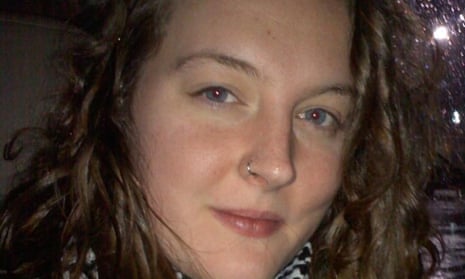A woman who says she was shackled to a bench within Chicago’s secretive interrogation facility for 18 hours before being permitted access to a lawyer described the ordeal as being “held hostage’’ in the police compound that has been likened to a CIA black site.
Vic Suter, a protester arrested before the 2012 Nato summit in Chicago, has told the Guardian about her experience of being detained inside Homan Square, a warehouse where multiple detainees allege they have been unable to contact legal counsel. Suter described a situation in which she was neither booked nor permitted a phone call – in defiance both of Chicago police procedures and a statement by police on Tuesday attempting to deny the Guardian’s reporting.
Suter’s account echoes that of Brian Jacob Church, whose story of extended detention without public notification and delayed legal access was featured in a Guardian’s exposé on Tuesday.
At the nondescript warehouse on Chicago’s west side, lawyers and arrestees say police detain suspects and witnesses for hours without booking or otherwise posting public notifications of their whereabouts, preventing their relatives and attorneys from knowing where they are.
Suter, whose recollection was backed up by her former lawyer Lillian McCartin, said she was shackled by her right wrist to a bar behind a bench in Homan Square for approximately 18 hours before she was permitted access to her attorney.
“The stark difference between Homan and a county jail or a precinct that has holding cells or any other concept of a common jail that most Americans have is that you have no rights at Homan,” Suter said.
“You are just kind of held hostage. The inability to see a lawyer is a drastic departure from what we consider our constitutional rights. Not being able to have that phone call, the lack of booking, makes it so that when you’re there, you understand that no one knows where you are.”
Arrested alongside Church on 16 May, 2012, Suter found herself taken to the same warehouse, only kept by herself in a different cell.
“You’re going to get a tour of hell in Homan,” she said the police officer who drove her to the warehouse told her.

Granted two breaks for the bathroom during 18 hours of shackling to the bench, Suter said she was interrogated in a good-cop-bad-cop fashion. The first officer, she said, barked basic questions about what she was doing in Chicago; the second brought her a burger from McDonald’s, which she didn’t eat. Suter was more concerned about the ankle cuffs that occasionally tightened when she moved in certain positions, cutting off her circulation.
After what she estimated to be 18 hours, Suter finally saw her lawyer, McCartin, speaking to her through a metal chain-link fence of the sort described by Church, other attorneys and former police superintendent Richard Brzeczek.
But it would be another two to three hours, Suter and McCartin estimated, before she was driven by police to an actual precinct, booked and permitted to call her mother. After a night in a holding cell, Suter was told she was free to go.
“Not being able to communicate outwardly by making a phone call or talking to a lawyer, and not being booked in so that someone can find you, you’re a hostage. It’s kidnapping.”
After the Guardian published its investigation on Tuesday, the Chicago police emailed a statement – the department’s only comment to the Guardian since it began publishing investigations into Chicago police abuse last week. The statement, without getting into details, cited the presence of undercover units as necessitating secrecy around Homan Square.
“CPD [the Chicago police department] abides by all laws, rules and guidelines pertaining to any interviews of suspects or witnesses, at Homan Square or any other CPD facility. If lawyers have a client detained at Homan Square, just like any other facility, they are allowed to speak to and visit them,” the statement read.
“It also houses CPD’s Evidence Recovered Property Section, where the public is able to claim inventoried property,” the statement said, something numerous attorneys and one Homan Square arrestee have denied.
“There are always records of anyone who is arrested by CPD, and this is not any different at Homan Square,” the statement continued.
Ahead of the same Nato protests, Church was held and questioned at Homan Square in 2012 following a police raid. Officers restrained him for the better part of a day, he told the Guardian, denying Church access to an attorney, before sending him to a nearby police station to be booked and charged.
Church said officers cuffed him to a bench for an estimated 17 hours, intermittently interrogating him without reading his Miranda rights to remain silent. After a lengthy and frantic search by his attorneys, Church said it took another three hours before he was finally charged with terrorism-related offenses at the nearby 11th district station, where he was made to sign papers, fingerprinted and photographed.
“Homan Square is definitely an unusual place,” Church told the Guardian in an interview on Friday. “It brings to mind the interrogation facilities they use in the Middle East. The CIA calls them black sites. It’s a domestic black site. When you go in, no one knows what’s happened to you.”
While multiple Chicago attorneys described their clients being beaten and “disappeared” inside Homan Square without a record, Church was the only person who had been detained at the facility who agreed to talk with the media until Wednesday.
Witnesses, suspects or other Chicagoans who end up inside Homan Square do not appear to have a public, searchable record entered into a database indicating where they are, as happens when someone is booked at a precinct. Lawyers and relatives insist there is no way of finding their whereabouts. Those lawyers who have attempted to gain access to Homan Square are most often turned away, even as their clients remain in custody inside.
